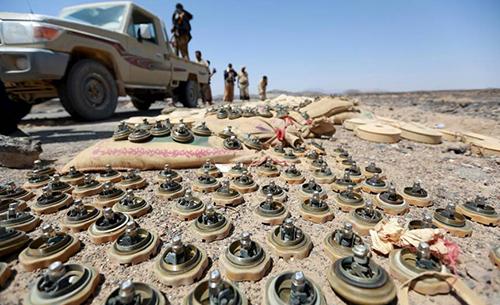Fierce battle for control of Yemen's Taez province
Fierce fighting raged Wednesday between Yemeni pro-government forces and Iran-backed rebels for control of a region near a key shipping channel at the mouth of the Red Sea, military sources said.
Sixteen rebels and eight loyalist fighters have been killed in 24 hours of clashes in the Dhubab area of the southwestern province of Taez near the Bab al-Mandab strait, they said.
Government forces backed by air and ground support from a Saudi-led coalition last week launched a major offensive aimed at driving the Huthi Shiite insurgents out of Taez.
They have faced strong resistance from the rebels, who seized the capital Sanaa in September 2014 before sweeping southwards, forcing President Abedrabbo Mansour Hadi to flee to Saudi Arabia.
Pro-government forces have retaken five provinces from the rebels since July.
But underscoring the challenge facing the loyalists, rebel forces managed to retake the region of Najd Qassim, on the road between Dhubab and Taez, from loyalists, the military sources said.
Forces loyal to Hadi also struggled to advance on Rahida, Taez's second-largest city which is in the hands of the Huthis and seen as crucial to recapturing the province, they added.
The Saudi-led coalition launched an air campaign in March to push back the rebels.
More than 5,700 people have been killed in the fighting while 82 percent of the population -- 21 million people -- are in urgent need of aid.
Tribal sources accused the coalition of killing four civilians, including a child, by mistake on Wednesday in an air raid that struck a house in a village between the provinces of Shabwa and Baida.
The coalition says it does not target civilians and has previously denied accusations it bombed two weddings in Yemen as well as a hospital run by the medical charity MSF.
Amnesty International and Human Rights Watch said in a joint statement Wednesday that the coalition had used a British-made cruise missile to destroy a Yemeni ceramics factory in Sanaa province in September.
It said the strike, using a British missile supplied in the 1990s, killed one person "and was in apparent violation of international humanitarian law, the laws of war".
"The UK should suspend further sales of aerial munitions to coalition members pending a thorough investigation into this case, and other apparently unlawful air strikes," said HRW's David Mepham.
Caption: Soldiers loyal to Yemen's government stand next to mines planted by the Houthi group in locations where they controlled in front line in the province of Marib
Related Posts

